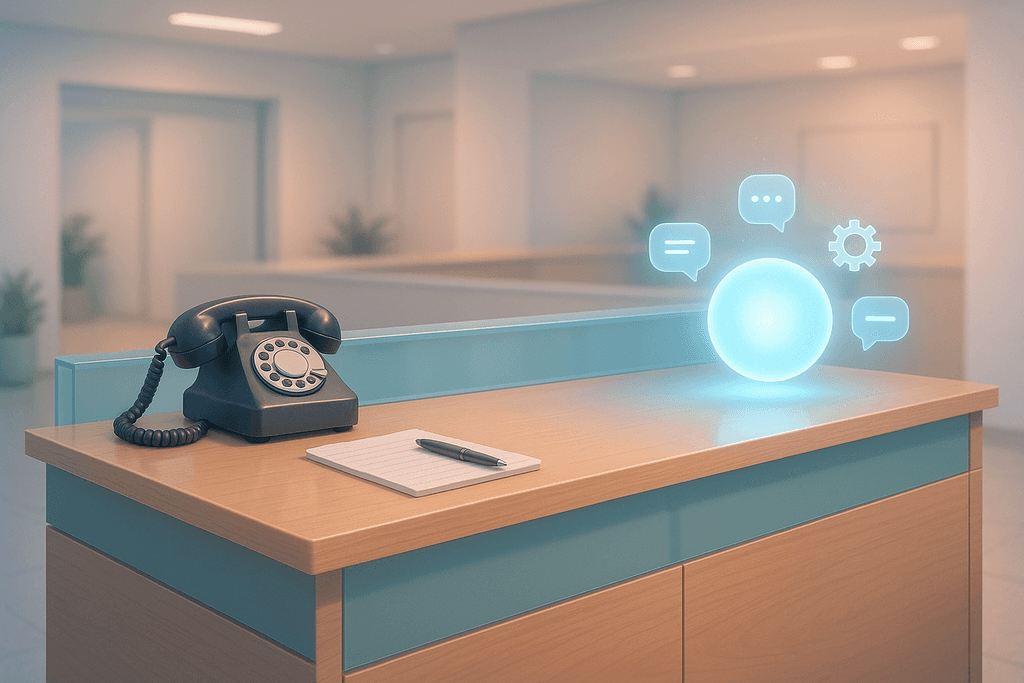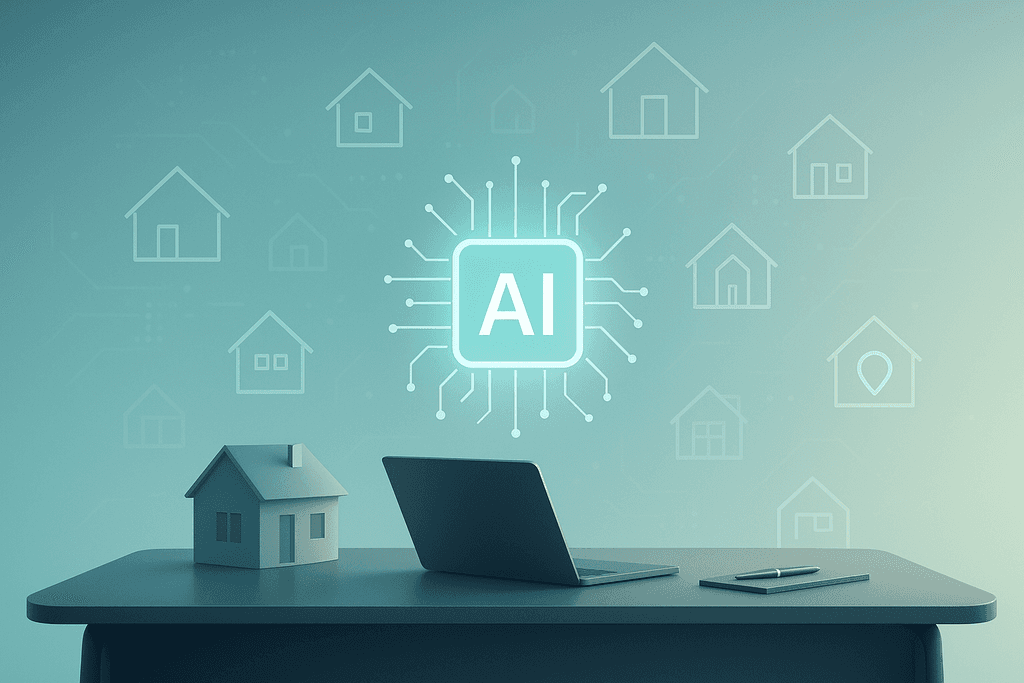Shopping for reception help can be confusing. Do you hire a virtual receptionist (a live human working remotely) or deploy an AI receptionist (software that answers calls and chats for you)? This guide compares cost, coverage, quality, and scalability—so you can choose with confidence.
How small-business reception evolved
Reception started at a front desk. As phones, websites, and messaging multiplied, small businesses turned to remote, human virtual receptionists to stay responsive without adding payroll. The latest shift is AI reception: voice and chat agents that answer instantly, 24/7, integrate with your calendar and CRM, and scale to handle multiple conversations at once.
Research highlight
- Median U.S. receptionist pay was $17.90/hour in May 2024—about $37K/year before taxes/benefits, a useful benchmark for staffing vs. outsourcing decisions (U.S. Bureau of Labor Statistics, 2024).
- Nearly half of consumers expect 24/7 support, and 74% will switch after poor service—coverage matters (Vonage Global Customer Engagement Report, 2024).
- Small-business AI adoption is now mainstream: 58% report using generative AI tools in 2025 (up from 40% in 2024), signaling readiness for AI reception (U.S. Chamber of Commerce, 2025).
What a virtual receptionist does
Virtual receptionists are real people who answer calls and messages from a remote location. Typical tasks include greeting callers, qualifying leads, taking messages, booking appointments, and transferring calls. Many services offer after-hours support, bilingual coverage, and basic scripting.
Strengths
- Human touch for nuanced or sensitive conversations.
- Minimal setup on your side—start quickly.
- Familiar experience for callers who prefer a live person.
Limitations
- Per‑minute billing and overage fees can spike with growth.
- Limited concurrency—only so many calls at once.
- Full 24/7 coverage may cost extra (nights/weekends/holidays).
Pricing note: Many live‑answer plans allocate a block of minutes and charge overages. Industry roundups show common entry tiers around 50–100 minutes with effective rates of roughly $2–$3 per receptionist minute; this varies by provider and plan (TechnologyAdvice pricing overview, 2025).
What an AI receptionist does
An AI receptionist uses speech recognition, natural‑language understanding, and integrations to answer calls and chats instantly, 24/7 call answering. It can qualify leads, answer FAQs, capture call‑backs, route to the right person, and text booking links during the call. Because software handles many conversations at once, wait times drop even during spikes.
Why small teams choose AI
- Consistency On‑brand, accurate answers every time.
- Scalability Handle multiple concurrent calls with no per‑minute stress.
- Integrations Connect calendars, forms, and CRMs so conversations become scheduled work.
- Voice + Chat Cover phone and website chat from one knowledge base.
How Small Business Chatbot helps
- Launch in minutes with a local phone number, natural voices, and spam filtering.
- Texts booking links mid‑call and logs transcripts for follow‑up.
- Built for small business support—no IT team required.
Cost and ROI: in‑house vs virtual vs AI
In‑house receptionist
- Median pay ≈ $17.90/hour (May 2024) ≈ $37K/year, plus benefits, taxes, workspace, and coverage for time off (BLS).
- Best for offices that require in‑person check‑in or complex, high‑touch tasks.
Virtual receptionist (live)
- Lower commitment than hiring; however, per‑minute pricing can climb with call volume.
- Best for low‑to‑moderate call volume and simple workflows.
AI receptionist
- Flat, predictable monthly software pricing (no per‑minute overages).
- 24/7 coverage without scheduling staff—aligns with rising consumer expectations for always‑on service.
- Improves capture when callers contact you after hours.
Simple ROI sketch (use your numbers)
Use this back‑of‑the‑napkin model to compare options:
- Missed‑call value: average revenue per new customer × monthly missed calls.
- Recovery rate: percent of missed calls you’d capture with better coverage (e.g., after‑hours pickup).
- Recovered revenue: missed‑call value × recovery rate.
- Total cost: in‑house (wages + 20–30% burden) vs. virtual (monthly + minutes) vs. AI (flat software).
- ROI: (recovered revenue − total cost) ÷ total cost.
Tip: If call spikes are common, factor in concurrency. Live services queue or miss calls; AI can handle multiple simultaneous conversations.
Quick decision framework
Choose a virtual receptionist if…
- Most conversations are nuanced, sensitive, or require empathy.
- Call volume is steady and modest (no big spikes).
- You’re comfortable with per‑minute billing and occasional overages.
Choose an AI receptionist if…
- You need reliable 24/7 call answering without staffing overhead.
- You face missed calls or hold queues during peak periods.
- You want instant scheduling, texting booking links, and CRM updates.
Go hybrid when…
- You want AI to cover after‑hours, weekends, or first‑line triage.
- Escalations route to your team or a live receptionist for complex cases.
- You’re transitioning from live to AI and prefer to phase changes.
Implementation playbook (7 steps)
- Map your top scenarios. List FAQs, lead‑intake questions, scheduling rules, and red‑flag escalations.
- Decide coverage windows. Start with nights/weekends, then expand to business hours if helpful.
- Write simple, on‑brand answers. Keep responses clear and brief; use your website content as source‑of‑truth.
- Connect calendars and forms. Ensure bookings, call‑backs, and lead forms route to the right owner. See product integrations.
- Set escalation rules. Define when AI should transfer, text a call‑back link, or capture a voicemail.
- Measure what matters. Track answered vs. missed calls, after‑hours conversions, and first‑call resolution.
- Iterate weekly. Review transcripts and fine‑tune answers, hours, and routing.
Best‑fit scenarios (virtual vs AI)
Great for virtual receptionists
- Medical, legal, or counseling intake with sensitive context.
- Complex qualification that benefits from human probing.
- Low nightly/weekend demand where 24/7 is optional.
Great for AI receptionists
- Local services (home, auto, wellness) with after‑hours demand.
- Sales teams that need instant scheduling and lead capture.
- High‑volume shops that see call spikes or frequent holds.
Frequently asked questions for virtual and AI receptionists
1) Will an AI receptionist replace my staff?
No. Most small businesses use AI to cover off‑hours, handle common questions, and schedule appointments so humans can focus on specialized work. A hybrid model is common.
2) Do callers get frustrated with AI?
Frustration usually comes from slow responses or no way to reach you. Fast, accurate answers and clear escalation options reduce friction. Always provide a path to a human when needed.
3) How does cost compare over a year?
In‑house hires add wages, benefits, and coverage for time off. Live virtual services bill per minute (costs rise with volume). AI is typically flat monthly pricing and scales well during spikes.
4) Will it integrate with my tools?
Yes—connect calendars, forms, and CRMs so calls and chats become scheduled work and logged activities. See integrations supported by Small Business Chatbot.
5) Is 24/7 support really necessary?
Consumer expectations are trending that way, and missed after‑hours calls are a common source of lost revenue. Always‑on coverage ensures you capture opportunities whenever they come in.
6) What about compliance and privacy?
Use least‑privilege access, secure storage of transcripts, and clear escalation for payments or medical details. For regulated industries, confirm vendor controls and sign required agreements.
7) How do I measure success?
Track answered vs. missed calls, after‑hours conversions, bookings created, and average response time. Review transcripts weekly and keep tuning your flows.
Bottom line
If you need empathy‑heavy conversations and modest call volume, a virtual receptionist can be a fit. If you want predictable costs, instant responses, and 24/7 call answering, an AI receptionist is hard to beat. Many small teams start hybrid—AI first, humans on escalation—and then expand AI coverage as confidence grows.



